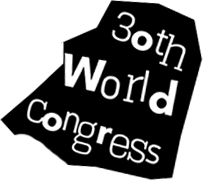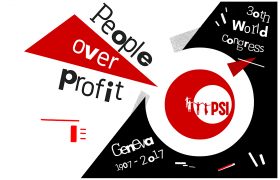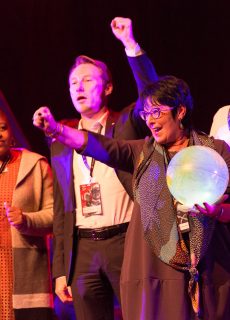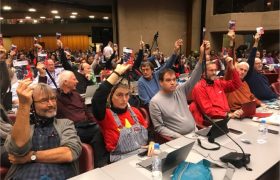
-
Congress photos
-
09:00
General Session (Constitution)
- 09:00-10:15 Room 1+2+3+4
-
10:15
Panel 7: Power to the People - Infrastructure in the age of Austerity
- 10:15-11:15 Room 1+2+3+4
The world has a large infrastructure backlog. In the developing world, basic infrastructure is needed to facilitate economic and social development – 1.8 billion people currently use water contaminated with faeces, risking cholera, dysentery, typhoid and polio, and 17% of the world’s population lack access to electricity. In the developed world, infrastructure built decades ago is crumbling and needs urgent upgrade.
While universal access is now on the UN’s agenda, we are told that in an age of austerity, private finance is the only answer. Wary of decades of evidence and public backlash from our successful campaigns, policy makers are keen to find less obvious models of privatisation to promote. The G20, OECD and World Bank are promoting the financialisation of infrastructure, which includes using capital from pension funds and sovereign wealth funds, creating business-friendly regulatory frameworks and underwriting corporate profits with state funds.
The evidence shows that these measures come with great economic and social risk and will likely result in rising inequality and corruption, as corporations receive state aid, raise prices and cut workers’ wages. The long-term nature of these deals allows corruption and political incompetence to go unchallenged, locks in inflexible contracts, reduces our ability to tackle climate change and saddles future generations with massive financial, ecological and social burdens.
But there are alternatives. Progressive taxation can raise revenue so that privatisations can be stopped. Insourcing, re-municipalisation and public-public partnerships are happening increasingly across the world.
Facilitated by Kate Bayliss
Research Fellow, School of Oriental and African Studies – SOAS, United Kingdom
Each panellist will give their views on the challenges we face building the infrastructure people need, the opportunities that exist and how we must take them.
Kate will discuss the current revival of interest in PPPs which received a considerable boost with the SDGs in the ‘financing for development’ agenda and continues to gain momentum with support from the World Bank and G20 and others including the global financial sector. Yet implementation is challenging, PPP investment is in decline and there is growing evidence of their limitations even from PPP supporters. She will talk about how this contradiction might develop and what resistance is emerging.
Panellists
Satoko Kishimoto
Researcher, Transnational Institute
Satoko will discuss resistance to privatizsation and the growing trend of re-municipalization. How to make labour and CSO coalitions work. The growing power of reclaiming privatizsed services movement, with both right and left local governmentHenry Garrido
Executive Director, American Federation of State, County and Municipal Employees – AFSCME, USA
Henry will discuss as trustee of NYCERS, evidence of financialization of infrastructure, difficulty of pension fund to take an anti-privatization stance (need to push the limits of “fiduciary responsibility”). Linking union privatizsation campaigJosé Luis Lingeri
General Secretary, Sindicato de Gran Buenos Aires de Trabajadores de Obras Sanitarias – SGBATOS
José Luis will discuss post re-nationalization and the potential of union participation in the management of water services. The key to improving public performance is to improve the skills of workers and integrate their experience in decision-makHelene Davis-Whyte
General Secretary, Jamaica Association of Local Government Officers – JALGO
Helene will discuss how fighting the privateers is an exercise in democracy; building anti-privatization campaigns and integrating worker and community interests, and holding governments to account, trade union involvement in policy-making. -
11:15
General Session (PoA and affiliate resolutions)
- 11:15-12:30 Room 1+2+3+4
-
12:30
Lunch break
- 12:30-14:00
-
14:00
Panel 8: Nothing about Us without Us
- 14:00-15:15 Room 1+2+3+4
All workers deserve respect and dignity and a voice in their trade unions and society. Recognising that vulnerable groups often suffer multiple discrimination, PSI promotes equality, equity and non-discrimination policies that contribute to build a more inclusive society.
At the same time, we recognise the specific needs of certain groups of workers and their human and labour rights. Building a progressive community of diverse people, working together for common objectives is our goal.
This session will address how we can achieve gender equality, LGBTI rights, inclusion of young people and people with disabilities, and ensuring that our societies provide support and empower the most vulnerable, including through participation in policy development, collective bargaining and union leadership.
Facilitated by Phyll Opoku-Gyimah
Head of Political Campaigns and Equality at PCS (UK), each panellist will give their views on the fight for inclusion, the victories we have achieved and how we can work together to build a diverse and inclusive society.
Panellists
Lauro Purcil
Chairman, Government Union for the Integration of Differently-Abled Employees – GUIDE/PSLINK, Philippines
Lauro Purcil Jr. will discuss the role of trade unions in promoting decent employment for persons with disabilities.
Fred van Leeuwen
General Secretary, Education International (EI), Netherlands
Fred van Leeuwen will discuss PSI/EI’s cooperation on LGBTQI issues and the global rise of extremism. He will share EI’s experiences and expertise on what trade unions need to do to build a more progressive community of diverse people.Isolde Kunkel-Weber
President, European Federation of Public Service Unions – EPSU,
Isolde Kunkel-Weber will discuss how European unions have addressed discriminatory policies within public services, achieved more women in leadership and equal pay policies that work.Juneia Batista
Chairperson, PSI World Women’s Committee, Brazil
Juneia Batista will discuss intersectional discrimination based on race, gender and class, using the Black women march in Brazil as an example. She will also outline new challenges for the next five years of PSI’s WOC.Ogaufi Matildah Masame
Deputy President, Botswana Public Employees Union – BOPEU, Botswana
Dr Ogaufi Masame will discuss trade union renewal: the future is now! -
15:15
General Session (PoA and affiliate resolutions)
- 15h15-17h00 Room 1+2+3+4
-
17:00
Standing Orders Committee Session and determinations regarding Emergency Resolutions (if needed; closed session)
- 17h00-18h00 Room 5+6
-
18:00
Visit to CERN (registration required)
- 18:00-20:30
At CERN, the European Organization for Nuclear Research, physicists and engineers are probing the fundamental structure of the universe.
They use the world’s largest and most complex scientific instruments to study the basic constituents of matter – the fundamental particles. The particles are made to collide together at close to the speed of light.
The process gives the physicists clues about how the particles interact, and provides insights into the fundamental laws of nature. Founded in 1954, the CERN laboratory sits astride the Franco-Swiss border just next to Geneva.
-
18:30
Movie Night: I, Daniel Blake - a 2016 drama film directed by Ken Loach
- 18:30-20:30
I, Daniel Blake is a 2016 drama film directed by Ken Loach. It stars Dave Johns as Daniel Blake, who is denied employment and support allowance despite his doctor finding him unfit to work. It is a scathing criticism of austerity policies and their impact on public services and the public at large. The film won the Palme d’Or at the 2016 Cannes Film Festival, the Prix du public at the 2016 Locarno International Film Festival and the 2017 BAFTA for Outstanding British Film.
Trailer:




















